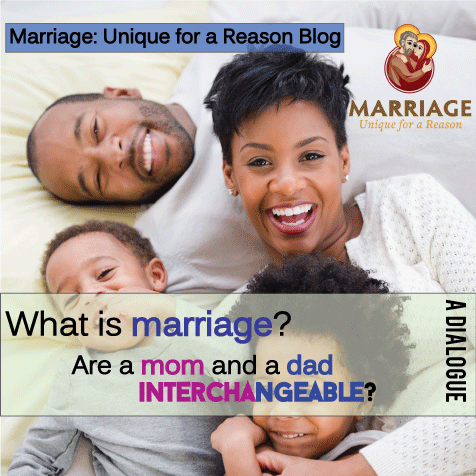 This is Part Three of a Six-Part series on the question, “What is Marriage?” Please check out parts one and two before this!
This is Part Three of a Six-Part series on the question, “What is Marriage?” Please check out parts one and two before this!
Socrates: So Bob, have you had a chance to think about what we talked about last time?
Bob: Yes, I have, and I realized that you are missing a really important fact.
Socrates: I am?
Bob: Yes. You are presenting the ideal. I’m talking about what’s real. There are a lot of children who, for lots of reasons, can’t be raised by their biological mother and father.
Socrates: I know that.
Bob: Well if that’s true, then it means that we have to accept the reality of the situation and try to do something good for the child, even if it is not ideal.
Socrates: You’re right. What are you proposing?
Bob: One of the ways we can help children is by allowing a same-sex couple to adopt them, thus creating a family.
Socrates: That’s a bit of a leap, isn’t it?
Bob: What do you mean?
Socrates: I mean that you looked compassionately at a tragic situation that many children find themselves in, and then jumped to a “solution” that doesn’t actually meet the need that they are experiencing.
Bob: I’m sorry; I still don’t quite follow you.
Socrates: Let’s say that a child is born to a mother and a father, who are both subsequently killed in a car accident. There is no other family, and the child is placed under the care of the state. That seems like the worst thing that can happen to the child, right?
Bob: Right. Even losing just one parent is terribly traumatic for a child.
Socrates: Exactly. So what has the child lost, when his or her parent dies?
Bob: The child has lost the real-life connection to and support of his or her mother and father; a relationship that should have guided the child into adulthood.
Socrates: Right. Like we talked about last time, a child would miss not just the functions that a mom and dad serve; he or she would miss the relationship to a person of each sex who relate to the child in a unique way, as well as the chance to observe the mom and dad relating to each other.
Bob: Yes, that’s right.
Socrates: Can you see how your solution—allowing two persons of the same sex to adopt—does not solve this problem?
Bob: You mean because the child will still be missing either a mom or a dad?
Socrates: Precisely.
Bob: I guess you’re right, but the child is still missing his or her own mom and dad, no matter what adoptive situation comes up. I don’t think it’s that big of a difference to the child whether he or she is adopted by a man and a woman or two people of the same sex, as long as the child is loved.
Socrates: It is true that an adopted child usually loses a real-life connection to their biological parents (at least most of the time) and that’s sad, no matter what happens next.
Bob: Adoption is always a response to a non-ideal situation—to a need or a deprivation experienced. Is that what you mean?
Socrates: Yes. But when the child is adopted by a married mother and father, he or she will still be given a concrete and living relationship with both a mom and a dad. They will still experience those different relationships and be able to observe the relationship between the parents as a model.
Bob: But there are plenty of children who are adopted or being raised by single parents who do just fine .
Socrates: The question of single parenthood is an interesting one and actually distinct from the question of adoption by two persons of the same sex. Perhaps we can take it up again at another time.
FAQ: Why is a child meant to have both a father and a mother?
Leave a Reply